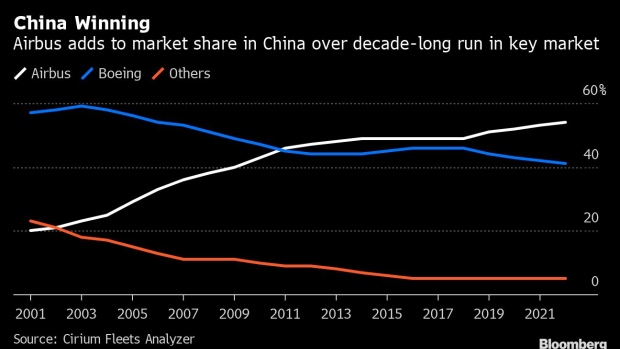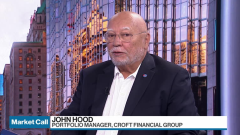Nov 13, 2022
Boeing Is Hoping Biden-Xi Talks Lead to a China Reopening
, Bloomberg News

(Bloomberg) -- Boeing Co. got a glimmer of hope after US President Joe Biden and his Chinese counterpart Xi Jinping called for a cooling of tensions at a face-to-face meeting on Monday.
After a three-hour meeting in Bali, Indonesia, Biden committed to send US Secretary of State Antony Blinken to China for a visit, and the countries pledged to continue talks on a range of issues. While aircraft sales didn’t come up as a topic, any improvement in relations is a welcome sign for Boeing.
It’s been 3 1/2 years since a mainland Chinese airline took delivery of a Boeing 737 Max aircraft -- a wait brought on by a pair of fatal crashes, a global pandemic and simmering tensions between the world’s two most powerful countries. China used to take a quarter of the cash-cow jets that the US planemaker built each year, and the beleaguered aerospace company could use a lift.
European rival Airbus SE has a lock on China’s lucrative narrow-body jet market for now -- and will until Biden can persuade Xi to let Boeing back in. The Arlington, Virginia-based company is supplying him with a compelling case. Boeing projects Chinese airlines will require 8,485 new passenger and freighter planes valued at $1.5 trillion over the next two decades, accounting for more than a fifth of global deliveries. Airbus and China’s homegrown manufacturer Comac are unlikely to meet that demand alone.
Read more: Biden’s meeting with Xi on sidelines of Group of 20
The question is whether the White House will press Xi on the matter as the countries broaden their diplomatic efforts. Biden’s administration is focused on the shortfall on Beijing’s side in delivering on a 2020 trade deal to buy tens of billions of dollars’ worth of Boeing planes.
But instead of asking for specific concessions for the aircraft maker, the White House views the situation in the broader context of Chinese economic practices that disadvantage many US companies beyond Boeing, a person familiar with the administration’s thinking said. On Monday, Biden raised China’s economic practices with Xi but didn’t specifically refer to Boeing.
“Boeing is a very important stakeholder. But Boeing on its own doesn’t determine our trade policy,” US Trade Representative Katherine Tai said in an Oct. 28 interview. “At the end of the day, my office is the Office of the US Trade Representative. And we do have to carry the focus on the entire United States.”
In private, senior Boeing officials and other aerospace executives have voiced frustrations over the lack of progress on trade. Biden’s foreign policy approach in general hasn’t been as transactional as that of his predecessor, Donald Trump. The current president’s priorities in relations with China include security concerns heightened by the war in Ukraine, tensions over Taiwan and steps to disentangle the world’s two largest economies.
“The priority is going to be stabilizing the political and military standoff, not commercial relations,” Richard Aboulafia, managing director with AeroDynamic Advisory, said of the Biden-Xi meeting.
Still, the first signs of a thaw this week could lead to upside for Boeing. The company isn’t counting on Chinese orders in its plan to restore cash flow, reduce its $57 billion in debt and emerge from crises that wiped out $150 billion in market value in the past three years. But they sure wouldn’t hurt.
“Aviation is a big part of the economic relationship between our two countries, and it has been for the last 50 years,” John Bruns, Boeing’s vice president of commercial sales and marketing for India and Southeast Asia, said in an interview last week. “We’re happy to see the dialogue happening.”
Boeing shares fell less than 1% at 10:27 a.m. in New York following Biden’s meeting with Xi. The stock had declined 12% so far this year through Friday’s close.
Nixon in China
Jetliners have been a barometer of US-China diplomacy since Richard Nixon first flew to Beijing on a Boeing 707 a half-century ago. Shock-and-awe aircraft orders have been a staple of head-of-state visits over the decades, underscoring China’s growing clout. In fact, Xi unveiled a splashy 300-jet deal worth $38 billion with his first official tour of the US in 2015.
American presidents get to use such orders as political wins, helping shore up the US trade deficit and create work for hundreds of thousands of people, between Boeing and its suppliers.
China is one of the last nations that hasn’t returned the workhorse 737 Max to commercial service following two fatal crashes in 2018 and 2019. That milestone has slipped repeatedly amid Covid flare-ups and lockdowns. It’s a big reason why Boeing twice pared its annual target for 737 deliveries this year to 375 planes, after initially aiming to hand over nearly 500 aircraft.
The planemaker has taken steps to reduce its exposure to China in recent months, including shopping undelivered jets earmarked for the country’s carriers. Boeing Chief Executive Officer Dave Calhoun has mapped out plans to churn out $10 billion in cash annually by mid-decade even if the US planemaker remains locked out of the People’s Republic.
Analysts fret that Boeing’s financial comeback, and its hopes of an evenly split global duopoly with Airbus, could sputter if it doesn’t restore 737 deliveries to China.
“The whole lack of progress, deterioration with China has been the biggest surprise of aerospace in 2022,” RBC analyst Ken Herbert said of Boeing. “We’re entering a new reality with China. And Boeing unfortunately is caught up a bit in the crosshairs.”
Covid Comeback
China signaled that it’s favoring Airbus, at least for now, by unveiling a 292-jet order in July, breaking from its practice of carefully balancing orders between the US and European planemakers. Its airlines will eventually need new Boeing jets, but can make do without them while quarantines and continued outbreaks depress demand. Douglas Harned, an analyst with Bernstein, doesn’t expect domestic flying to fully reopen until the second half of 2023, followed by international travel in 2024.
During the trade stalemate, Boeing’s share has declined to 37.5% of the firm order backlog while Airbus’s stake rose to 62.5%, according to Cirium’s comparison of the two manufacturers’ sales in isolation from other planemakers.
“Boeing will be a part of that market inevitably, but their share is unlikely to return to 50%,” said George Dimitroff, head of valuations for Cirium, an aviation consultant.
Boeing could gain from Beijing’s initial steps toward relaxing some of its Covid measures, which should encourage more travel from neighboring countries in southeast Asia -- and eventually bring more plane sales, said George Ferguson, analyst with Bloomberg Intelligence.
“China doesn’t need to open to Boeing right away,” he said. “We just need more flying in the region for Boeing to see a benefit.”
--With assistance from Danny Lee and Angus Whitley.
(Updates with result of talks in second paragraph)
©2022 Bloomberg L.P.


